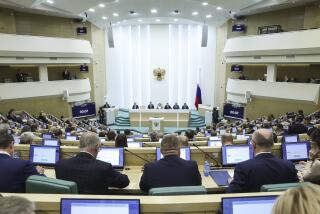China Conducts A-Test; Clinton Weighs Renewal
- Share via
HONG KONG — China broke a yearlong international moratorium Tuesday by setting off an underground nuclear explosion despite a personal appeal from President Clinton, who swiftly responded with an order that the United States prepare to resume its own nuclear testing program.
China’s test took place in the remote Xinjiang Autonomous Region in northwestern China, the Chinese government confirmed. Clinton asked China to cancel the test in September after preparations for the explosion were spotted by U.S. intelligence agencies.
Within hours after the Tuesday explosion, Clinton ordered the Department of Energy to make the necessary preparations so that the United States will be ready to reactivate its own underground nuclear testing program next year.
Last July, the President had announced a moratorium on American testing at least through September, 1994, but he said at the time that the United States would start its program again “if this moratorium is broken by another nation.”
However, Tuesday’s White House statement spoke only of planning and stopped short of actually committing the United States to new nuclear tests.
The independent Verification Technology Information Center in London said that Tuesday’s explosion at the Lop Nor test site, 150 miles southeast of the city of Urumqi, was recorded by 71 seismic stations around the globe. The 80- to 90-kiloton blast, the equivalent of 80,000 to 90,000 tons of TNT, was the first recorded test by a nuclear power in more than a year.
In official statements, the Chinese government said it needed the test to build up its defense system.
“It is entirely for the purpose of self-defense that China develops and possesses a small number of nuclear weapons,” said one statement, read over China Central Broadcasting radio.
However, a statement carried by the official New China News Agency said that China, the only major power that had a net increase in defense spending last year, would push for a comprehensive ban on testing by 1996 if the other nuclear powers agreed to drastic cuts.
The statement said it is up to countries with the largest nuclear arsenals to “bear the special responsibility by taking the lead to cut down their own nuclear development.”
China last conducted underground tests on Sept. 25, 1992, just two days after the last U.S. test. A nuclear power since the 1960s, China joined the Nuclear Non-Proliferation Treaty in 1991.
Diplomatic sources in Beijing said the test could exacerbate already strained relations with the United States. Over the past three months, China and the Clinton Administration have tangled on several fronts involving arms proliferation.
In September, the United States imposed trade sanctions on Chinese industries involved in aerospace business with American firms. The Administration acted on the basis of intelligence reports that China had supplied Pakistan with advanced missile technology in violation of international arms control protocols.
Although the latest test was conducted at a time when Russia--a nuclear power--briefly flirted with civil war, diplomats in Beijing said they did not believe the turmoil in the former Soviet republic was a factor in the timing of the Chinese test.
“This nuke thing is more a matter of China thumbing its nose at the United States,” commented Robin Munro, a Hong Kong-based China analyst and human rights activist.
On Capitol Hill, Sen. John Glenn (D-Ohio) quickly called for withdrawal of China’s most-favored-nation trade benefits, which permit it to export goods to the United States with the same low duties enjoyed by most other nations.
“To continue granting China MFN status sends entirely the wrong signal to China and the world,” Glenn said.
Administration officials said they were not surprised by China’s decision to carry out its test. When Secretary of State Warren Christopher met Chinese Foreign Minister Qian Qichen at the United Nations last week, one senior U.S. official said Tuesday, “We could tell from the body language that they were going ahead (with plans for a nuclear test).”
Several experts on China and on nuclear testing said they doubt that the Chinese test was intended as a message to the United States.
“This is something they (the Chinese) had planned for some time, before the President’s initiative (to persuade China not to test),” said one State Department official. “I don’t think they did it to go out of their way to annoy us.”
This was China’s 39th test since it became a nuclear-weapons state with its first explosion in 1964. China has conducted tests on the average of one or two a year for the past 15 years.
In a written statement Tuesday, the White House said the United States “deeply regrets” China’s action and called upon China “to join the other nuclear powers in a global moratorium.”
The U.S. Defense Department reportedly favors new American nuclear tests, while the Energy Department and the Arms Control and Disarmament Agency would like to continue the current moratorium. The careful wording of the White House statement Tuesday cheered advocates of a ban.
“He (Clinton) has given himself a little room to make a decision,” said Mendelsohn. “It’s pretty clear the White House looked at this and decided not to plunge over the deep end yet. . . . If we start again, everyone will test.”
Tempest reported from Hong Kong and Mann from Washington.
More to Read
Sign up for Essential California
The most important California stories and recommendations in your inbox every morning.
You may occasionally receive promotional content from the Los Angeles Times.













